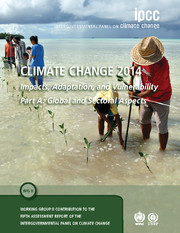 Climate Change 2014 – Impacts, Adaptation and Vulnerability: Part A: Global and Sectoral Aspects
Climate Change 2014 – Impacts, Adaptation and Vulnerability: Part A: Global and Sectoral Aspects Book contents
- Frontmatter
- Contents
- Foreword, Preface, and Dedication
- Summary for Policymakers
- Technical Summary
- Cross-Chapter Boxes
- Chapters 1-20
- Chapter 1 Point of Departure
- Chapter 2 Foundations for Decision Making
- Chapter 3 Freshwater Resources
- Chapter 4 Terrestrial and Inland Water Systems
- Chapter 5 Coastal Systems and Low-Lying Areas
- Chapter 6 Ocean Systems
- Chapter 7 Food Security and Food Production Systems
- Chapter 8 Urban Areas
- Chapter 9 Rural Areas
- Chapter 10 Key Economic Sectors and Services
- Chapter 11 Human Health: Impacts, Adaptation, and Co-Benefits
- Chapter 12 Human Security
- Chapter 13 Livelihoods and Poverty
- Chapter 14 Adaptation Needs and Options
- Chapter 15 Adaptation Planning and Implementation
- Chapter 16 Adaptation Opportunities, Constraints, and Limits
- Chapter 17 Economics of Adaptation
- Chapter 18 Detection and Attribution of Observed Impacts
- Chapter 19 Emergent Risks and Key Vulnerabilities
Chapter 1 - Point of Departure
Published online by Cambridge University Press: 05 January 2015
- Frontmatter
- Contents
- Foreword, Preface, and Dedication
- Summary for Policymakers
- Technical Summary
- Cross-Chapter Boxes
- Chapters 1-20
- Chapter 1 Point of Departure
- Chapter 2 Foundations for Decision Making
- Chapter 3 Freshwater Resources
- Chapter 4 Terrestrial and Inland Water Systems
- Chapter 5 Coastal Systems and Low-Lying Areas
- Chapter 6 Ocean Systems
- Chapter 7 Food Security and Food Production Systems
- Chapter 8 Urban Areas
- Chapter 9 Rural Areas
- Chapter 10 Key Economic Sectors and Services
- Chapter 11 Human Health: Impacts, Adaptation, and Co-Benefits
- Chapter 12 Human Security
- Chapter 13 Livelihoods and Poverty
- Chapter 14 Adaptation Needs and Options
- Chapter 15 Adaptation Planning and Implementation
- Chapter 16 Adaptation Opportunities, Constraints, and Limits
- Chapter 17 Economics of Adaptation
- Chapter 18 Detection and Attribution of Observed Impacts
- Chapter 19 Emergent Risks and Key Vulnerabilities
Summary
1.1. The Setting
This chapter describes the information basis for the Fifth Assessment Report (AR5) of IPCC Working Group II (WGII) and the rationale for its structure. As the starting point of WGII AR5, the chapter begins with an analysis of how the literature for the assessment has developed through time and proceeds with an overview of how the framing and content of the WGII reports have changed since the first IPCC report was published in 1990. The future climate scenarios used in AR5 are a marked change from those used in the Third (TAR, 2001) and Fourth (AR4, 2007) Assessment Reports; this shift is described here, along with the new AR5 guidance for communicating scientific uncertainty. The chapter provides a summary of the most relevant key findings from the IPCC Special Report on Renewable Energy Sources and Climate Change Mitigation (IPCC, 2011), the IPCC Special Report on Managing the Risks of Extreme Events and Disasters to Advance Climate Change Adaptation (IPCC, 2012), and the AR5 Working Group I (The Physical Science Basis) and AR5 Working Group III (Mitigation of Climate Change). Collectively these recent reports, new scenarios, and other advancements in climate change science set the stage for an assessment of impacts, adaptation, and vulnerability that could potentially overcome many of the limitations identified in the IPCC WGII AR4, particularly with respect to the human dimensions of climate change.
The critical review and synthesis of the scientific literature published since October 2006 (effective cutoff date for AR4) has required an expanded multidisciplinary approach that, in general, has focused more heavily on societal impacts and responses. This includes an assessment of impacts associated with coupled socio-ecological systems and the rapid emergence of research on adaptation and vulnerability.
WGII AR5 differs from the prior assessments primarily in the expanded outline and diversity of content that stems directly from the growth of the scientific basis for the assessment.
- Type
- Chapter
- Information
- Climate Change 2014 – Impacts, Adaptation and Vulnerability: Part A: Global and Sectoral AspectsWorking Group II Contribution to the IPCC Fifth Assessment Report, pp. 169 - 194Publisher: Cambridge University PressPrint publication year: 2014


